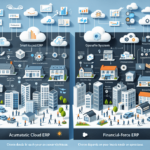NetSuite ERP vs Acumatica Cloud ERP
Enterprise Resource Planning (ERP) systems have drastically transformed the way businesses operate today. They streamline various processes, provide real-time visibility into data, and drive overall growth and efficiency. If you are in the market for an ERP system, you might have come across NetSuite ERP and Acumatica Cloud ERP. Both are popular options, and this article will compare their features, benefits, pricing, and more to help you make an informed decision.
Introduction to ERP Systems
Before diving into a comparison of NetSuite ERP and Acumatica Cloud ERP, it's crucial to understand what ERP systems are and how they work. An ERP system is a set of integrated business applications that manage and automate various processes such as finance, HR, inventory, procurement, manufacturing, and more. ERP systems provide a centralized database that allows easy access to real-time data, enabling better decision-making.
ERP systems are designed to streamline business operations and improve efficiency. By automating repetitive tasks and providing real-time data, ERP systems can help businesses reduce costs, increase productivity, and improve customer satisfaction. Additionally, ERP systems can be customized to meet the specific needs of a business, making them a valuable tool for companies of all sizes and industries.
Understanding NetSuite ERP
NetSuite ERP is a cloud-based ERP system tailored for small to medium-sized businesses. It offers a wide range of functionalities, including financial management, supply chain and inventory management, order management, project management, and more. NetSuite ERP provides a unified, real-time view of business operations, enabling businesses to streamline their processes and lower costs.
One of the key benefits of NetSuite ERP is its scalability. As a business grows, it can easily add new users and functionalities to the system without worrying about infrastructure or hardware upgrades. This makes it an ideal solution for businesses looking to expand their operations and needing a system that can grow with them.
Another advantage of NetSuite ERP is its flexibility. The system can be customized to meet the specific needs of a business, with the ability to add new modules and features as required. This means that businesses can tailor the system to their unique requirements, rather than adapting their processes to fit the limitations of the software.
For more detailed information on NetSuite’s offerings, visit the NetSuite official website.
Understanding Acumatica Cloud ERP
Acumatica Cloud ERP is also a cloud-based ERP system designed for small to mid-sized businesses. Similar to NetSuite ERP, it offers a range of functionalities, including financial management, distribution, manufacturing, project accounting, and more. Acumatica ERP's modular structure allows businesses to add functionalities as they scale.
One of the key advantages of Acumatica Cloud ERP is its flexibility. It can be customized to meet the specific needs of a business, allowing for a more tailored solution. Additionally, Acumatica ERP offers a mobile app that allows users to access the system from anywhere, at any time, making it a convenient option for businesses with remote workers or those who need to access the system while on the go.
Another benefit of Acumatica Cloud ERP is its pricing model. Unlike some other ERP systems, Acumatica ERP does not charge per user, which can be a cost-saving measure for businesses with a large number of employees. Instead, it charges based on the resources used, such as the number of transactions or the amount of storage needed. This can make it a more affordable option for growing businesses.
For more insights into Acumatica’s offerings, visit the Acumatica official website.
Features and Benefits of NetSuite ERP
Key Features
- Accounting and Financial Management: Comprehensive finance and accounting tools to manage finances and revenue.
- Order Management: Real-time visibility into inventory, sales, and customer data, allowing businesses to fulfill orders quickly and accurately.
- Supply Chain and Inventory Management: Advanced inventory management functionalities such as demand planning, purchasing, and warehouse management.
- Project Management: End-to-end project management functionalities that help businesses deliver projects on time and within budget.
- E-commerce: Capabilities for businesses to launch, manage, and scale their e-commerce operations.
Benefits
- Real-Time Data: Provides a real-time view of business data, enabling quick and informed decision-making.
- Scalability: Highly scalable and can grow alongside the business.
- Lower Total Cost of Ownership: Cloud-based deployment eliminates the need for costly hardware and software infrastructure.
Another important feature of NetSuite ERP is its customer relationship management (CRM) capabilities. With NetSuite ERP, businesses can manage their customer interactions and relationships more effectively. The CRM functionalities include lead and opportunity management, sales forecasting, and customer service management, helping businesses improve customer satisfaction and retention rates.
For additional details, refer to Gartner's review of NetSuite ERP.
Features and Benefits of Acumatica Cloud ERP
Key Features
- Financial Management: A complete financial management suite including general ledger, accounts payable, accounts receivable, and more.
- Distribution: Optimized inventory management, order management, and fulfillment processes.
- Project Accounting: Project-centric accounting functionalities, helping businesses manage project profitability.
- Manufacturing: Production planning, scheduling, and more to manage manufacturing processes effectively.
- CRM: Customer relationship management functionalities to improve customer engagement.
Benefits
- Flexible and Scalable: Modular structure enables businesses to add functionalities as needed and scale accordingly.
- Customizable: Allows businesses to customize the system to their specific workflows and requirements.
- Intuitive User Interface: Easy-to-use interface with a short learning curve.
In addition to the above features and benefits, Acumatica Cloud ERP also offers robust reporting and analytics capabilities. With Acumatica's built-in reporting tools, businesses can easily generate financial reports, sales reports, inventory reports, and more. The system also offers advanced analytics functionalities, allowing businesses to gain insights into their operations and make data-driven decisions.
For further information, visit Acumatica's feature page.
Deployment Options: On-Premise vs Cloud-Based
NetSuite ERP and Acumatica Cloud ERP both offer cloud-based deployment options. However, Acumatica Cloud ERP also offers on-premise deployment, giving businesses more flexibility in how they deploy and manage their ERP system.
On-premise deployment means that the ERP system is installed and hosted on the company's own servers, rather than being hosted in the cloud. This can be beneficial for companies with strict security requirements or limited internet connectivity. However, it also requires more IT resources and maintenance compared to cloud-based deployment. Ultimately, the decision between on-premise and cloud-based deployment depends on the specific needs and resources of the business.
For comprehensive insights on deployment options, refer to TechRadar's guide on ERP deployment.
Integration Capabilities of NetSuite ERP vs Acumatica Cloud ERP
Both NetSuite ERP and Acumatica Cloud ERP offer robust integration capabilities with other business applications. NetSuite ERP offers pre-built integrations with over 500 applications, while Acumatica Cloud ERP offers integration with over 2,000 applications through its API.
While Acumatica Cloud ERP offers a larger number of integrations, NetSuite ERP's pre-built integrations are often more comprehensive and require less customization. Additionally, NetSuite ERP offers a SuiteCloud Developer Network, which allows developers to create custom integrations and applications specifically tailored to a company's unique needs.
For more details on integration capabilities, visit Gartner's NetSuite ERP review and Gartner's Acumatica ERP review.
Customization and Flexibility of NetSuite ERP vs Acumatica Cloud ERP
Both NetSuite ERP and Acumatica Cloud ERP offer customization functionalities that allow businesses to tailor the system to their unique needs and workflows. However, Acumatica Cloud ERP has a more flexible and open architecture that allows for more extensive customization than NetSuite ERP.
Furthermore, Acumatica Cloud ERP offers a wider range of integration options with other software and applications. This means that businesses can easily connect their ERP system with other tools they use, such as CRM software or e-commerce platforms, to create a more streamlined and efficient workflow. NetSuite ERP, on the other hand, has more limited integration options and may require additional customization to connect with other software.
For in-depth information on customization, refer to Acumatica's customization options and NetSuite's customization services.
Pricing Comparison: Which is More Cost-Effective?
Pricing for NetSuite ERP and Acumatica Cloud ERP varies based on factors such as the number of users, the functionalities needed, and the deployment option. A direct comparison of pricing is challenging as it depends on the specific requirements of each business. However, Acumatica Cloud ERP is generally considered more cost-effective as it is more modular and offers flexible pricing options based on add-on functionalities.
While Acumatica Cloud ERP may be more cost-effective in terms of pricing, NetSuite ERP offers a more comprehensive suite of features and functionalities. This may be a deciding factor for businesses that require a more robust ERP system to meet their specific needs. Additionally, NetSuite ERP offers a more streamlined and integrated solution, which can lead to increased efficiency and productivity for businesses.
For a detailed pricing analysis, consult G2's NetSuite reviews and G2's Acumatica reviews.
User Interface and Ease of Use Comparison
Both NetSuite ERP and Acumatica Cloud ERP offer intuitive user interfaces with easy-to-use functionalities. However, Acumatica Cloud ERP is generally considered to have a shorter learning curve and a more user-friendly interface, making it easier for businesses to train their employees.
Acumatica Cloud ERP offers customizable dashboards that allow users to easily access the information they need most. This feature can save time and increase productivity for businesses with specific reporting needs.
On the other hand, NetSuite ERP offers a wider range of integrations with other software and platforms, making it a more versatile option for businesses with complex IT infrastructures. This can be especially beneficial for larger organizations with multiple systems that need to communicate with each other.
For user interface insights, explore Software Advice's NetSuite profile and Software Advice's Acumatica profile.
Customer Support Comparison: Which Offers Better Service?
Both NetSuite ERP and Acumatica Cloud ERP offer extensive customer support services, including phone, email, and knowledge base support. However, NetSuite ERP is known for having a more responsive and efficient customer support team, providing timely resolutions to issues.
Customer support quality can significantly impact the user experience and overall satisfaction with an ERP system. It's advisable to reach out to both providers to understand their support structures and response times before making a decision.
For more information on support services, visit NetSuite Support and Acumatica Support.
Industry-Specific Functionality Comparison
NetSuite ERP offers industry-specific functionalities for businesses in sectors such as retail, manufacturing, and services. Similarly, Acumatica Cloud ERP provides industry-specific functionalities for sectors like distribution, manufacturing, and retail. However, Acumatica ERP is known for being more customizable to specific industry needs.
Choosing an ERP system that aligns with your industry can streamline processes and provide tailored solutions that address unique challenges. It's essential to evaluate how each ERP system caters to your industry's specific requirements.
For industry-specific features, refer to NetSuite's industry solutions and Acumatica's industry solutions.
Security and Data Protection Comparison
Both NetSuite ERP and Acumatica Cloud ERP are designed with security in mind and offer various security features such as multi-factor authentication, role-based access control, and data encryption. However, NetSuite ERP has stricter security protocols and certifications, making it a better fit for businesses operating in regulated industries.
Data security is paramount for any ERP system. Businesses should assess the security measures of each ERP provider to ensure they meet industry standards and regulatory requirements.
For more on security features, visit NetSuite Security and Acumatica Security.
Case Studies: Real-Life Examples of Companies Using NetSuite ERP and Acumatica Cloud ERP
Many companies have successfully implemented NetSuite ERP and Acumatica Cloud ERP to streamline their operations and drive growth. For example, a wholesale distribution company, Brandwise, switched to Acumatica Cloud ERP to gain better visibility into its inventory and accelerate order fulfillment. Similarly, a footwear company, Steve Madden, implemented NetSuite ERP to streamline its order management, improve financial processes, and drive growth.
These case studies highlight how different businesses leverage ERP systems to address their unique challenges and achieve their goals.
To explore more case studies, visit Acumatica Customer Stories and NetSuite Customer Success.
Conclusion: Which is the Better Option for Your Business?
Both NetSuite ERP and Acumatica Cloud ERP offer comprehensive, cloud-based ERP functionalities that can benefit small to mid-sized businesses. However, the better option for your business depends on your specific requirements and priorities, such as customization needs, scalability, pricing, security, and more. Careful evaluation of both systems' features, benefits, and limitations will enable you to make the best choice for your business.
To ensure you select the right ERP system, consider conducting a thorough needs assessment, consulting with stakeholders, and potentially engaging with a third-party ERP consultant.








